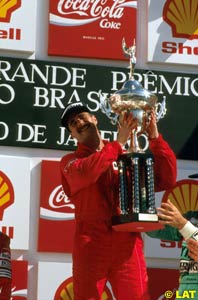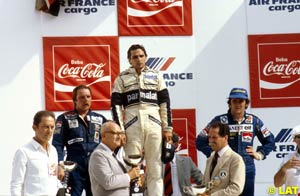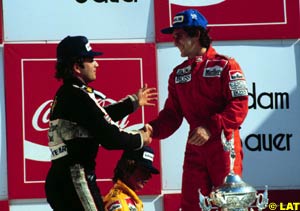
Atlas F1 Magazine Writer
Who has been the most successful driver in Brazil? What driver has the biggest amount of retirements? And what are the odds of having another race winner at Interlagos? Marcel Schot brings the answers and more anecdotes on the Brazilian Grand Prix
However, it's been a long time since Ayrton Senna won an emotional victory in his 1993 home Grand Prix. This season, Rubens Barrichello is once again the focus of his countrymen. The Ferrari driver probably thinks otherwise, since he doesn't go well at Interlagos, to put it mildly. In the nine times he raced there, he finished only once. That was in 1994, when he scored a superb fourth place in the Jordan.
After that, disaster upon disaster happened. Especially the 1999 race took on dramatic proportions for Barrichello. Qualifying went very well and he equalled Stewart's best ever grid position: third. To the crowd's enjoyment, second place man David Coulthard stalled his engine before the start, leaving only Mika Hakkinen ahead of their star.
Three laps into the race, the crowd erupted in more cheering. All of a sudden, Hakkinen's McLaren slowed down dramatically and Barrichello grabbed the lead. After that, the McLaren picked up speed again, but Hakkinen dropped to third place. Until his pitstop in lap 27, Barrichello remained in the lead. Sadly, after 42 laps the Stewart's engine died and Rubinho's race ended in tears.
Barrichello's lack of luck in his home Grand Prix doesn't stand alone though. When it comes to finishing races, Brazilians do notoriously bad in their own country. Out of the 84 times a Brazilian started his home Grand Prix, only 43 times did he finish as well - 48.8%. Only the Japanese (45.0% in 40 starts), Swedes (38.5% in 13 starts) and Australians (20.0% in 5 starts) did worse.
Barrichello's number of retirements on home ground is nowhere near the record, though - Andrea de Cesaris retired in 21 out of the 27 races on Italian soil he attended. And even Barrichello's retirement rate of 87.5% isn't the worst. Apart from numerous drivers who competed in their home Grand Prix once or twice and failed to finish, there's also former Arrows owner Jackie Oliver. In six attempts at the British Grand Prix, he never finished, making it a 100% retirement rate.
Enough about home advantages and disadvantages, though. After two races this season, we have two winners. Looking at the last twenty years, it's not very likely that we'll have a third winner. Only five times in the last twenty years the season started with three different race winners:
Twenty years ago, the Brazilian Grand Prix took place in the midst of a lot of political bickering. The previous Grand Prix in South Africa had the drivers going on strike, after which the FISA imposed $5000 fines and two year suspensions to no less than 29 drivers. As a result, the Argentine Grand Prix, originally the second Grand Prix of the season, was put back and Brazil became round two of the Championship.
Brazil then became a struggle between FOCA aligned teams and non FOCA aligned teams. The FOCA teams, most notably Williams and Brabham, made use of disposable weight to effectively drive the races underweight. They were doing this by adopting water cooled brakes. They would start the race with tanks full of water, which would then empty as the race progressed, making the cars very light. At the end of the race, these water tanks were refilled again, after which the cars were back to legal weight.
Another driver who collapsed a lot on the podium and even on the track was Nigel Mansell. He is said to be a melodramatic person, more often than not over reacting in various situations. However, in the case of the 1989 Brazilian Grand Prix there wasn't much overreacting on Red Five's part. Moments after lifting the huge trophy after winning his first race for Ferrari, the Briton cut his hand on a sharp edge, making the ceremony one of the more dramatic ones in the past twenty years.
Seeing as Alain Prost is the driver with the most wins in Brazil, it's not strange that McLaren is the team with the most wins.
Lotus's nine podium finishes are even more the work of many drivers. Emerson Fittipaldi was the winner, while Jacky Ickx, Carlos Reutemann, Elio de Angelis, Nigel Mansell, Ayrton Senna and Nelson Piquet also landed on the podium with the legendary marque. Surprisingly, De Angelis scored the most Lotus podiums in Brazil.
Last year's Brazilian Grand Prix broke a seven year string of World Champion winners: ever since Michael Schumacher won the 1994 race and went on to win the title that season, the winner in Brazil grabbed the title for that year. In 2001, however, David Coulthard grabbed a solid victory after early leader Juan Pablo Montoya was put out of the race by Arrows driver Jos Verstappen.
 Besides for future Champions, the Brazilian Grand Prix is also successful for native drivers. Seven times a Brazilian won his home Grand Prix. Only the Britons (22 home wins) and French (8 home wins) are more successful on home soil (not including the Indianapolis 500s that counted towards the Championship in the 50s).
Besides for future Champions, the Brazilian Grand Prix is also successful for native drivers. Seven times a Brazilian won his home Grand Prix. Only the Britons (22 home wins) and French (8 home wins) are more successful on home soil (not including the Indianapolis 500s that counted towards the Championship in the 50s).
 The race was run in extreme heat and won by Brabham driver Nelson Piquet, ahead of Williams' Keke Rosberg. Piquet suffered from the heat, collapsing on the podium before receiving his trophy. However, as the podium ceremony took place, Renault and Ferrari were already launching a protest against the top two drivers. They were successful and the win went to Renault driver Alain Prost, who thus scored the first of his six Brazilian victories.
The race was run in extreme heat and won by Brabham driver Nelson Piquet, ahead of Williams' Keke Rosberg. Piquet suffered from the heat, collapsing on the podium before receiving his trophy. However, as the podium ceremony took place, Renault and Ferrari were already launching a protest against the top two drivers. They were successful and the win went to Renault driver Alain Prost, who thus scored the first of his six Brazilian victories.
Wins Podiums
McLaren 10 22
Ferrari 6 16
Williams 5 14
Benetton 2 7
Brabham 2 3
Renault 2 2
Ligier 1 3
Lotus 1 9
Jordan 0 2
Tyrrell 0 2
Arrows 0 1
Fittipaldi 0 1
March 0 1
Prost 0 1
Sauber 0 1
Shadow 0 1
 This shows it's territory for the big three with two well scoring others. Benetton scores well with two wins and seven podium finishes, but unlike what you'd expect, it's not all Michael Schumacher's job. The German scored two wins and two thirds with the team, but Jean Alesi, Gerhard Berger and Giancarlo Fisichella also scored podiums.
This shows it's territory for the big three with two well scoring others. Benetton scores well with two wins and seven podium finishes, but unlike what you'd expect, it's not all Michael Schumacher's job. The German scored two wins and two thirds with the team, but Jean Alesi, Gerhard Berger and Giancarlo Fisichella also scored podiums.
Past Performance by Current Drivers
| 1996 | 1997 | 1998 | 1999 | 2000 | 2001 | Average Qualifying Position |
|||||||
| Qual | Race | Qual | Race | Qual | Race | Qual | Race | Qual | Race | Qual | Race | ||
| M.Schumacher | 3 | 3 | 2 | 5 | 4 | 3 | 4 | 2 | 3 | 1 | 1 | 2 | 2.833 |
| Barrichello | 2 | R | 11 | M | 13 | M | 3 | M | 4 | M | 6 | R | 6.500 |
| Coulthard | 14 | R | 12 | 10 | 2 | 2 | 2 | M | 2 | DQ | 5 | 1 | 6.166 |
| Raikkonen | - | - | - | - | - | - | - | - | - | - | 10 | R | 10.000 |
| R.Schumacher | - | - | 10 | M | 8 | R | 11 | 4 | 11 | 5 | 2 | R | 10.500 |
| Montoya | - | - | - | - | - | - | - | - | - | 4 | R | 4.000 | |
| Heidfeld | - | - | - | - | - | - | - | - | 19 | M | 9 | 3 | 14.000 |
| Massa | - | - | - | - | - | - | - | - | - | - | - | - | - |
| Fisichella | - | - | 7 | 8 | 7 | 6 | 5 | M | 5 | 2 | 18 | 6 | 8.400 |
| Sato | - | - | - | - | - | - | - | - | - | - | - | - | - |
| Villeneuve | 3 | R | 1 | 1 | 10 | 7 | 21 | M | 10 | M | 12 | 7 | 9.500 |
| Panis | 15 | 6 | 5 | 3 | 9 | M | 12 | 6 | - | - | 11 | 4 | 10.400 |
| Trulli | - | - | 17 | 12 | 12 | M | 13 | M | 12 | 4 | 7 | 5 | 12.200 |
| Button | - | - | - | - | - | - | - | - | 10 | 6 | 20 | 10 | 15.000 |
| Frentzen | 9 | M | 8 | 9 | 3 | 5 | 8 | 3 | 7 | 3 | 8 | M | 7.166 |
| Bernoldi | - | - | - | - | - | - | - | - | - | - | 16 | M | 16.000 |
| Irvine | 10 | 7 | 14 | 16 | 6 | 8 | 6 | 5 | 6 | R | 13 | R | 9.166 |
| de la Rosa | - | - | - | - | - | - | 18 | M | 16 | 8 | - | - | 17.000 |
| Yoong | - | - | - | - | - | - | - | - | - | - | - | - | - |
| Webber | - | - | - | - | - | - | - | - | - | - | - | - | - |
| Salo | 11 | 5 | 22 | 13 | 20 | M | - | - | 22 | DNS | - | - | 18.750 |
| McNish | - | - | - | - | - | - | - | - | - | - | - | - | - |
Please Contact Us for permission to republish this or any other material from Atlas F1.
|
Volume 8, Issue 13
Atlas F1 Exclusive
The One Engine Rule: Mosley's Choice
The One Engine Rule: Back to the Future
The One Engine Rule: What it All Means
The One Engine Rule: Jo's View
Articles
Jo Ramirez: a Racing Man
Renault Resurgence
Brazilian GP Preview
Brazilian GP Preview
Local History: Brazilian GP
Facts, Stats & Memoirs
Columns
Brazilian GP Quiz
Bookworm Critique
Elsewhere in Racing
The Grapevine
> Homepage |